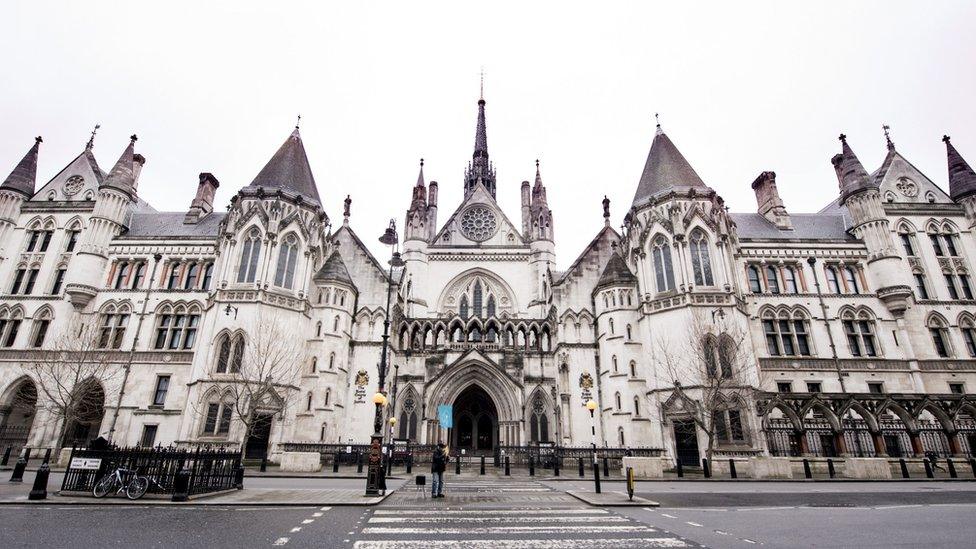Home secretary could face contempt of court charge
- Published

Home Secretary Priti Patel could face a charge of contempt of court after failing to follow an order to house an Iranian sex offender.
The High Court said it wants to know why the Home Office had failed to comply with the mandatory injunction.
It is exceptionally rare for judges to threaten ministers and their officials with contempt of court over a failure to follow a court instruction.
A Home Office spokesman said the department had already apologised.
The row with the court emerged in a judgment published on Tuesday about a failure to provide emergency housing to Kharajan Arshad Fathula Mohammad in the north west of England.
The Iranian national was jailed in 2016 for 20 months for a sexual offence involving a child.
Left jail - but not deported
Foreign national offenders jailed for more than 12 months typically face deportation from the UK - but Mohammad was bailed from immigration detention in May 2018.
Last October he asked the Home Office for basic emergency housing under a law for destitute people whose claims to stay in the UK have been rejected, but who are also not likely to be removed from the country in the near future.
A week later Home Office officials told him he would be found a bed.
But, according to a High Court judgment, that did not happen.
No accommodation
A fortnight before Christmas, officials said they were still struggling to find suitable accommodation because of both the applicant's criminal conviction and the enormous pressures that the pandemic had placed on the Home Office-managed accommodation system.
On 29 January, a High Court judge ordered the home secretary to act because Mohammad was still sleeping rough and support workers said he was at risk of killing himself or contracting coronavirus.
After five days, still nothing had changed.
That lack of action triggered a new court order, from a second senior judge, demanding the home secretary explain what was going on.
A senior government lawyer then confirmed there had been a failure to comply.
"The delay in providing accommodation to the claimant was due to difficulties the [home secretary] has faced with compliance in the light of the current demand on the asylum support system," said the lawyer in a letter.

High Court: Two senior judges had to intervene in the case
"I accept that... [the home secretary] should have made the appropriate application to the court for an extension of time once it became clear that she could not comply with the previous order."
London round trip plan
Immigration officials then proposed putting Mohammad in a London hotel. That plan required an unrealistic late night round-trip by taxi from Manchester, at their expense. As a result, he slept on the streets again.
Officials have now told the court that suitable accommodation has been found in north-west England.
But Mr Justice Chamberlain, the second of the two judges to intervene in the case, said the home secretary must now provide a full account, external of what happened - and the court would consider whether the failure should lead to a full contempt of court hearing.
This is the ancient offence of disobeying or ignoring a court and its orders. The government's own guidance, external says anyone found to be in contempt "could go to prison for up to two years, get a fine, or both."
In practice, warnings of contempt of court are sometimes a means to publicly force an individual or organisation into properly complying with an instruction.
In his highly critical ruling, Mr Justice Chamberlain said: "Breach of an injunction is a matter which can result in proceedings for contempt. This is so even where the breach is by a minister.
"If the evidence provides sufficient reassurance that the breach was not intentional and that measures have been put in place to avoid any recurrence, further proceedings may be unnecessary."
The home secretary has until 16:00 GMT on 22 February to respond.
A Home Office spokesperson said: "We have apologised to the court for failure to comply with the order in time and will be submitting a full statement, which explains the reasons for this delay.
"Sourcing accommodation for individuals with convictions of this nature can be particularly challenging and we have also seen increased pressure on the asylum system due to the pandemic. It is standard practice for Secretaries of State to be named in court documents for legal actions brought against their departments."
The BBC has contacted Mr Mohammad's lawyer for comment.
